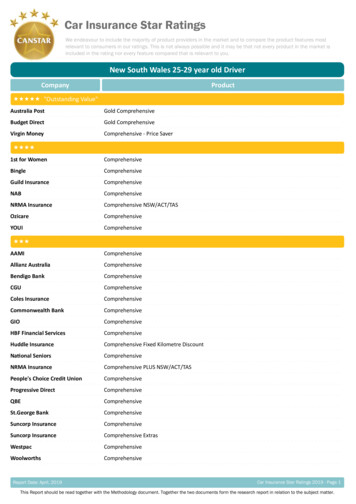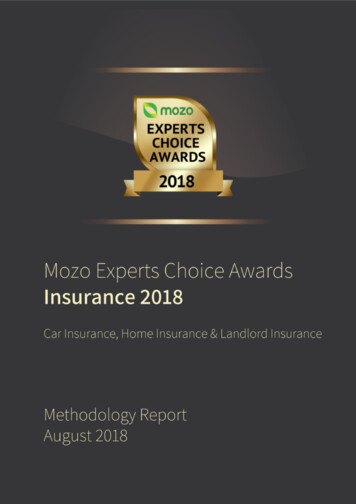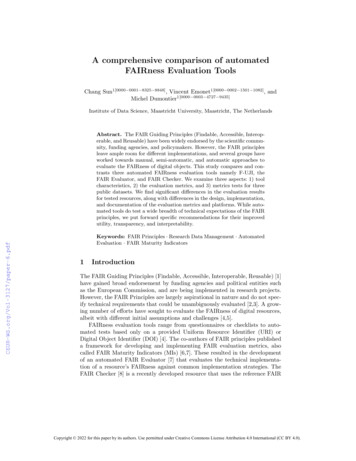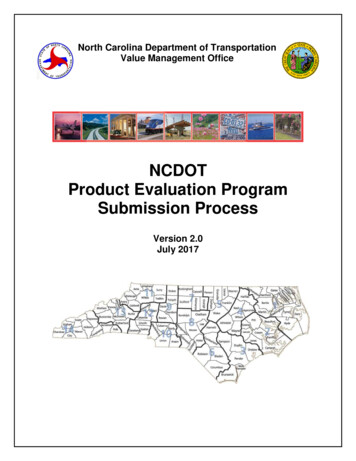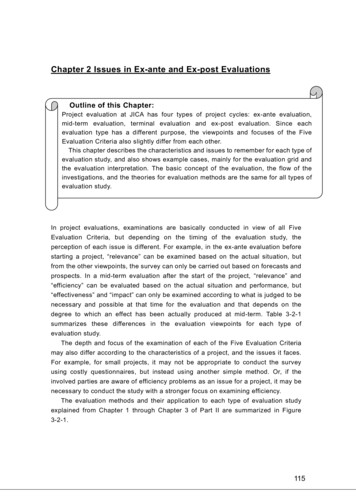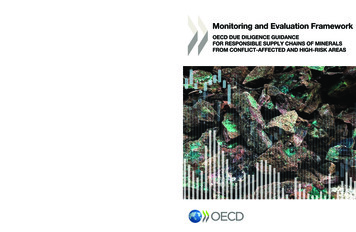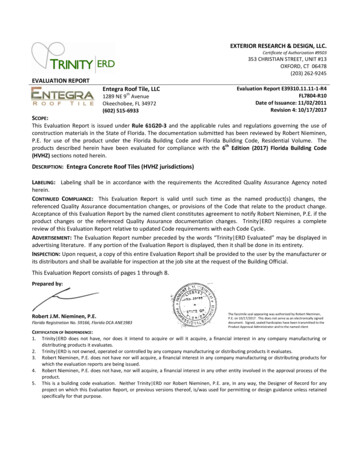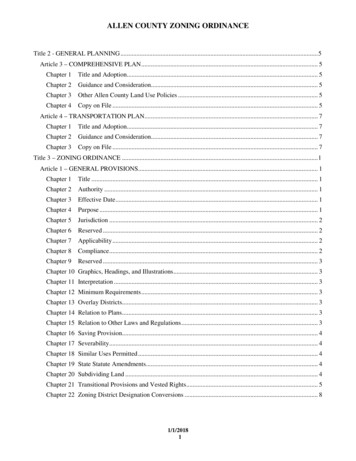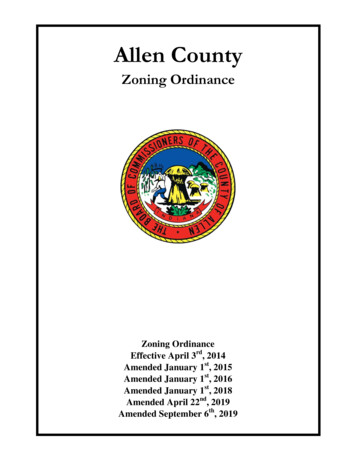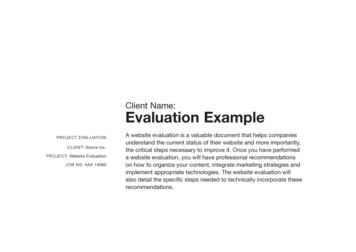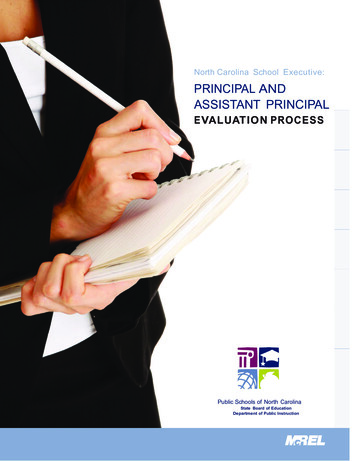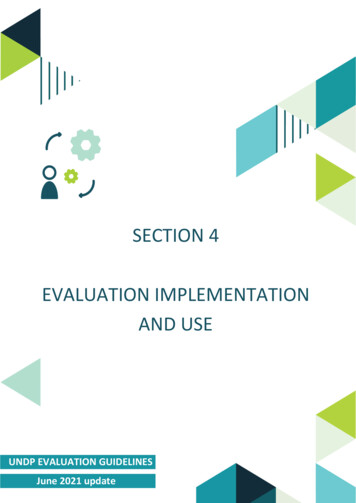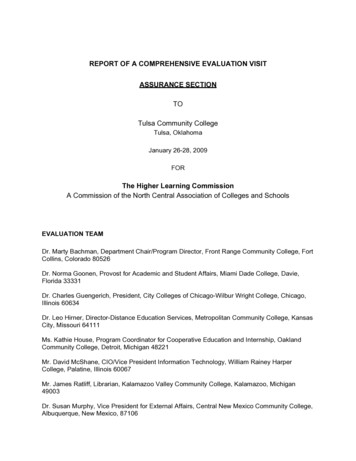
Transcription
REPORT OF A COMPREHENSIVE EVALUATION VISITASSURANCE SECTIONTOTulsa Community CollegeTulsa, OklahomaJanuary 26-28, 2009FORThe Higher Learning CommissionA Commission of the North Central Association of Colleges and SchoolsEVALUATION TEAMDr. Marty Bachman, Department Chair/Program Director, Front Range Community College, FortCollins, Colorado 80526Dr. Norma Goonen, Provost for Academic and Student Affairs, Miami Dade College, Davie,Florida 33331Dr. Charles Guengerich, President, City Colleges of Chicago-Wilbur Wright College, Chicago,Illinois 60634Dr. Leo Hirner, Director-Distance Education Services, Metropolitan Community College, KansasCity, Missouri 64111Ms. Kathie House, Program Coordinator for Cooperative Education and Internship, OaklandCommunity College, Detroit, Michigan 48221Mr. David McShane, CIO/Vice President Information Technology, William Rainey HarperCollege, Palatine, Illinois 60067Mr. James Ratliff, Librarian, Kalamazoo Valley Community College, Kalamazoo, Michigan49003Dr. Susan Murphy, Vice President for External Affairs, Central New Mexico Community College,Albuquerque, New Mexico, 87106
Assurance SectionTulsa Community College/1101ContentsI. CONTEXT AND NATURE OF VISIT .1II. COMMITMENT TO PEER REVIEW.5III. COMPLIANCE WITH FEDERAL REQUIREMENTS .6IV. FULFILLMENT OF THE CRITERIA .6CRITERION ONE: MISSION AND INTEGRITY. .6CRITERION TWO: PREPARING FOR THE FUTURE. .8CRITERION THREE: STUDENT LEARNING AND EFFECTIVE TEACHING.10CRITERION FOUR: ACQUISITION, DISCOVERY, AND APPLICATION OFKNOWLEDGE.12CRITERION FIVE: ENGAGEMENT AND SERVICE. .14V. STATEMENT OF AFFILIATION STATUS .15VI. ADDITIONAL COMMENTS AND EXPLANATIONS .1721/26/09
Assurance SectionTulsa Community College/1101I. CONTEXT AND NATURE OF VISITA. Purpose of VisitThis visit was conducted as a comprehensive visit for continued accreditation at TulsaCommunity College (TCC), a comprehensive public institution of higher educationB. Organizational ContextTCC is a mature urban multi-campus institution located in Tulsa, Oklahoma. Establishedin 1970, the college has grown to serve the metropolitan area with transfer, career,technical and developmental education as well as various workforce training programs.C. Unique Aspects of VisitThe team visited two of the college’s four campuses; inclement weather preventedadditional campus visits. The college was closed on the second and third day of the visitalthough the team was on site at the Southeast campus and did visit with college staff,faculty, select council members, self-study coordinators and others who came to campusfor scheduled interviews. The team included an experienced SACS consultant-evaluatorwho complemented the visiting team and brought new insights and experiences to bear.D. Sites or Branch Campuses VisitedTeam members visited the college’s Southeast and Metro campuses; at both campuses,members toured facilities and held meetings with students, staff, and faculty. An openmeeting with college administrators below the cabinet level was held at the Southeastcampus.E. Distance Education ReviewedPrograms and services in distance education were reviewed as a part of thecomprehensive visit; the college had received a focused visit culminating in approval tooffer full degree programs online in 2004. Since this approval, the college hasdeveloped the capacity for students to earn a number of certificates and degrees onlineand has goals to increase its online offerings and programs, both to grow its enrollmentand to address the needs of identified populations.Students report satisfaction with and confirmed the rigor of current online courses.Headed by the Dean of Distance Learning, this office provides support for facultyinterested in designing and offering online courses. Predominantly full-time facultyteach TCC online courses, and both faculty and administrators recognize this as apotential barrier to planned growth. Work on a new Intellectual Property policy will alsobe critical to expanded offerings, and the faculty indicated that they had a very activerole in drafting a proposal.
Assurance SectionTulsa Community College/1101The college utilizes Blackboard Enterprise for its course management system and thissystem is capable of supporting the anticipated growth; completion of the SunGardBanner student system should provide seamless interaction between both systems.The Distance Learning program will be greatly augmented by the opening of the Centerfor Creativity later this year. Interviews, facilities toured, and documents reviewedbefore and during the site visit indicate that the college has made the necessaryinvestment in infrastructure to meet current and future goals.F. Interactions with ConstituenciesAssociate Vice President of Human ResourcesActing Associate Vice President for Student AffairsAssociate Vice President for Student AffairsDirector of Financial AidArtistic Director Performing Arts InstituteAssociate Dean Allied HealthActing Associate Dean Nursing ProgramExecutive Vice President and CFOPresidentStudents at Metro/Southeast CampusStaff at Metro/Southeast CampusFaculty at Metro/Southeast CampusProvosts at all CampusesAcademic Vice PresidentActing Associate Vice President for Academic AffairsBoard of RegentsLearning and Instructional DesignersDistance Learning Committee – including online facultyProvostsInterim Chief Technology OfficerTelecommunications SupervisorDean, Distance LearningDean, Student Services-Southeast CampusInstitutional Effectiveness CommitteeDean of Workforce DevelopmentDean of University TransferDean of Student Services – Metro CampusMedia/ITV ManagerPresident’s CabinetSelf-Study ChairsAssociate DeansGroup meeting with AdministratorsGroup meeting with students Conference Call, Advisory Committee MembersDirector, Academic and Campus Services (ACS), Northeast CampusDirector, Institutional Research21/26/09
Assurance SectionTulsa Community College/1101Group meeting, Institutional Effectiveness Council and Achieving the Dream Committee(administrators and faculty)Dean of Learning Resources CenterCampus Police OfficersDirector of Campus PoliceVice President for External AffairsAllied Health Faculty MembersCommunity business and service representatives phone conference.LibrarianBookstore ManagerBookstore clerkCustodianFood service clerkG. Principal Documents, Materials, and Web Pages Reviewed1999 NCA visit report2003 Request for Institutional Change – online degrees (Resource Room)2004 Computer Efficiency2004 HLC Report of a focus visit2006 Effective Communications2008 Class Schedule2008 Engaged LearningAchieving the Dream (Website, data, articles)Achieving the Dream Score Card (Resource Room)Annual Financial Audit Reports – 2004, 2005, 2006, 2007, 2008 (RR 145)Annual Planning and Budget Forms (RR 149)Annual Technology Program Plan (Online Resource Room)Articulation agreement examples (RR 138)Assessment – Discipline Goals / Program CompetenciesAssessment Academy ApplicationAuditor Report, June 2007bb.tulsacc.edu (online courses)College CatalogConnection, issue 410, v56 (2)Convocation speech by Pres. McKeonCredits, Program Length, and Tuition (RR 142)Curriculum Committee Handbook and minutesDiscipline Goal/Program Competency AssessmentDiscipline Self-Study ReportsDiversity Council CharterDiversity Council Five-Year Plan Fall 2007Diversity Dialog Mission StatementDiversity StatsEducational and General Budgets – 2005, 2006, 2007, 2008, 2008 (RR 146)Faculty Appraisal Form31/26/09
Assurance SectionTulsa Community College/1101Faculty Association MinutesFaculty Handbooks – full and part-timeFaculty Innovation Grants Awarded 2001-2009 (Online Resource Room)Financial Records Summary Reports (RR 148)Financial Statements June 30, 2008 and 2007First Stop Project PlanFull Time and Part time Faculty Human Resources FilesFull time teaching load matrixGeneral Ledger by Account – July 2004 through September 2008 (RR 148)Goals and Competencies by Discipline/Program Fall 2007Institutional agreement examples (RR139)Institutional Data file #205Institutional Snapshot; Institutional Data; Organization ChartIR Web site (assessment.tulsacc.edu/IRAWeb)IT Tactical PlanLRC MissionLRC Policy NotebookMarketing SurveysOnline Courses, random, total of 5Planning and Budgeting Business Process Transformation Step1 Team Report(Online Resource Room)Policies, Practices, and Procedures Handbook for:Full time Professional StaffFull time staff handbookPart time InstructorsPart time staff handbookPrevious comprehensive accreditation reports, including focus visit (2004)Process and Criteria for Using Student Activities FundsPublic Disclosure Documents (Cleary, FERPA, HLC affiliation) (RR 143A)Roster of all Faculty Teaching Assignments, Fall 2008 and Spring 2009Salary schedulesSample TranscriptsSelf-StudySelf-Study addendumSpring 2009 Course ScheduleStaff Development PoliciesStudent Compliant Log (RR 143B)Student NewspaperStudent Policy and Resources HandbooksStudent Service Benchmarking Taskforce Report and RecommendationsStudent Services and ActivitiesSurvey Report on Leadership 101Syllabi for On-line CoursesSyllabi for Regular ClassesTA Task Force Meeting 5-21-2008 – Criterion 241/26/09
Assurance SectionTulsa Community College/1101TCC Board of Regents Policy Manual (RR 102A)TCC Connection NewspaperTCC Course CatalogTCC Faculty Association Constitution (RR 101A)TCC Information Technology Strategic Plan (RR 150A)TCC Newsbytes electronic newsletterTCC Organization Chart Jan 2009Technology Master Plan 2005 (Online Resource Room)Technology Plan (Online Resource Room)The Eighth Floor Spring 2009 Course CatalogThird Party Comment Notices and Comments received (RR 144)Title III documents (RR 140)Title IV and Default management plan (RR 141)TJC(TCC) Charter and Original Accreditation Legislation (RR 100)Subjective Metrics site - http://www.subjectivemetrics.com/index.cfmTCC Assessment Site - http://assessment.tulsacc.edu/IRAWeb/TCC Web site - http://www.tulsacc.edu/TCC’s Learning Resources web site – http://lrc.tulsacc.eduTCC’s Lotus Notes site – http://notes.tulsa.cc.ok.usVision 2025 (www.vision2025.info/page.php?page aboutvision2025)II. COMMITMENT TO PEER REVIEWA. Comprehensiveness of the Self-Study ProcessThe team found the self-study document to be a well-written and comprehensivedocument. The college’s self-study process involved all constituent groups andcampuses of the college. The team had access to many additional documents inelectronic form to assist their preparation. Access to documents, websites and onlinecourses was particularly helpful to the team.B. Integrity of the Self-Study ReportThe self-study report accurately reflected the state of the institution, its practices andpolicies. The report was candid, descriptive and evaluative even as the collegeobjectively critiqued its operations and conduct. In some cases where the collegeidentified opportunities for improvement there have already been efforts to improve.C. Adequacy of Progress in Addressing Previously Identified ChallengesThe institution has responded to all previously identified challenges. However, the teamnotes that the college still faces some of these same issues now, due to very differentcircumstances. The issues of concern, communication and organizational structure andassessment, are addressed in the body of this report.51/26/09
Assurance SectionTulsa Community College/1101D. Notification of Evaluation Visit and Solicitation of Third-Party CommentRequirements were fulfilledIII. COMPLIANCE WITH FEDERAL REQUIREMENTSThe team reviewed the required Title IV compliance areas and student complaint information.All materials were in order and no areas of concern are noted.IV. FULFILLMENT OF THE CRITERIACRITERION ONE: MISSION AND INTEGRITY.The organization operates with integrity to ensure the fulfillment of its mission throughstructures and processes that involve the board, administration, faculty, staff, and students.1. Evidence that Core Components are met.a) Recent review and re-statement of the college’s vision mission and values statementhas already served to reinforce the college’s new direction of “one college” intendedto eliminate internal competition and instill a sense of common purpose across theinstitution. TCC’s mission statement is prominently displayed throughout the college,serving as a reminder to employees and the public at-large of the college’s mission.Interviews confirmed that the mission is embraced by both internal and externalconstituencies aiding in the success of accomplishing the goals of the institution.b) The recently signed agreement among the president, Faculty Association and theCollege Staff Council regarding shared governance is a notable accomplishment thatunderscores the collective interest at the college to move forward positively on thecollege’s mission while acknowledging differences in perception. The teamrecognizes that the college will still debate various issues but is moving beyondpreviously identified barriers.c) A committed Board of Regents devotes its time and talents to support the mission ofTCC. Their support as advocates for the institution is increasing the visibility of TCCas an institution of higher learning in the community.d) Advisory Board members actively contribute to TCC’s occupational programs to keepthe curriculum current and to ensure that the curriculum meets the workforce needsof the community.e) TCC’s comprehensive online course offerings provide opportunities for place bound61/26/09
Assurance SectionTulsa Community College/1101students and thus expand the mission of the institution beyond physical boundariesof the campus locations.f) TCC responds rapidly to the expressed needs of the community (e.g., the creation ofthe resource center for veterans). This ability to respond to the needs of thecommunity serves to make TCC a community focal point.g) The development of First Stop Centers is designed to streamline and improvestudent services and provide consistency of information so as to help TCC betterachieve its mission and goals.h) The existing partnerships with public agencies, not-for-profit organizations, localschool districts, and private businesses aid TCC in both publicizing andaccomplishing its mission and goals.i) TCC’s human resources provide polices, practices and procedure handbooks foreach of the various staffing units for the mutual benefit of individuals and theinstitution. Handbooks provide clarity for employees in terms of organization,general policies and procedures, salary, and benefits. Such handbooks andmaterials are available in electronic form via TCC’s portal “MyTCC.”2. Evidence that one or more specified Core Components need organizationalattentiona) Recent changes in the college’s administrative structure combined with new hires inthe executive ranks have left some uncertainty in the mid-management ranks as toextent of authority or the appropriate channels for reporting and making requests.Though different efforts have been undertaken to improve the situation, difficultiespersist. TCC needs to assess the effectiveness of the administrative reorganizationin terms of its impact on its own identified problems of internal communication. TCCneeds to determine if the changes effected in organizational structure areaccomplishing the intended purposes. The team perceives that the college’s issuesin administrative structure and communication are related.b) Conversations with internal constituents confirmed the Self-Study findings thatinternal communication at TCC was uneven and at times this inhibited the ability ofstaff to serve students adequately. TCC needs to develop internal mechanisms toimprove communication at all levels in the institution. Failure to improve internalcommunication especially on developing initiatives, will compromise services to allstakeholders.c) The absence of comprehensive faculty evaluations (full-time and part-time)conducted by supervisors through class visits, review of student evaluations, etc.compromises the college’s ability to fulfill its obligation to maintain and strengthenquality. The college has not created a formal process evaluating part-time and fulltime faculty teaching effectiveness.3. Evidence that one or more specified Core Components require Commission71/26/09
Assurance SectionTulsa Community College/1101follow-up.4. Evidence that one or more specified Core Components are not met and requireCommission follow-up. (Sanction or adverse action may be warranted.)Recommendation of the TeamCriterion is met; no Commission follow up recommended.CRITERION TWO: PREPARING FOR THE FUTURE.The organization’s allocation of resources and its processes for evaluation and planningdemonstrate its capacity to fulfill its mission, improve the quality of its education, andrespond to future challenges and opportunities.1. Evidence that Core Components are meta) TCC’s effort to provide increased access to higher education through the TulsaAchieves initiative serves the community and is forward thinking. This effort hasincreased community awareness of the mission of TCC and can only have a positiveimpact in the community.b) The decision to participate in the Achieving the Dream program will aid the college inanalyzing data and using data to make decisions for future planning efforts.c) TCC has adequate financial resources to support current operations and fund futuredevelopment of programs and facilities; prudent management will allow the institutionto continue to improve programs and services.d) Active program advisory councils comprised of professionals from various fieldsprovide advice on future trends to aid TCC in planning for curriculum improvements;this participation helps TCC meet the workforce needs of Tulsa County.e) The recent lease agreement of computer equipment with Dell will allow TCC toreplace computer equipment on a regular schedule while eliminating the highdisposal costs, thereby lowering the college’s environmental impact, and providingthe latest technology for teaching and learning.f) Institutional planning occurs at many different levels involving internal constituentsfrom across the college. Recent planning efforts support the institution’s move toincreased shared governance.g) The annual budget planning process secures input from faculty and staff and thenthrough the administrative structure. Stakeholder input is gathered and prioritized forthe allocation of available resources.h) The new Center for Creativity located on the Metro Campus will provide new learningopportunities for students throughout the college with facilities for teaching arts,multimedia communications, and journalism.81/26/09
Assurance SectionTulsa Community College/1101i)In preparing for growth and improved services to employees and students, TCC isreplacing its business systems, human resources, finances, and student services,with the SunGard Banner system. This change will provide “enhanced self-service”opportunities to students and employees and improve business process efficiency.Additionally, to help support students and employees with these changes, thecollege has established a Help Desk which has already served to reduce frustrations.j) A significant investment has been made in updating existing facilities and buildingnew facilities, such as the new Health Sciences and Biotechnology Learning Center.These new facilities increase learning opportunities that integrate technology forstudents in Nursing and Allied Health programs, support the implementation of newacademic programs such as Biotechnology, and provide opportunities for neweducational partnerships with local high schools for teacher technology training andenrichment activities for high school students.k) Good financial planning and fiscal management practices are evident in the strongfiscal position of TCC as reflected in the reports of the external audits. The financialstrength of the TCC will allow it to continue to fulfill its mission well into the future.l) The Student Recruitment Office measures effectiveness of its efforts to shepherdstudents from their initial contact with TCC through to enrollment. The office tracksits progress with weekly reports on recruitment. TCC is able to tally the number ofstudents who are asking for information about the college then monitor and trackstudents through the registration. Results are then used to improve the contactmanagement system.m) Significant accomplishments have been made in the area of student supportservices. The “First Stop” model at the Northeast, Metro and West campuses hasprovided students with a menu of enrollment and support services giving them astreamlined enrollment experience of admission, registration, financial aid and more.2.Evidence that one or more specified Core Components need organizationalattentiona) The survey data collected from students participating in the Tulsa Achieves Programneeds to be used to strengthen the program through increased staff knowledge,improved service in financial aid, and most importantly in developing a system ofconsistent information to students.b) Although the college has developed a participatory budget process, there is a lack ofa feedback loop that informs internal constituents of the decision making prioritiesused to fund various projects and defer funding of others. The lack of this feedbackloop may result in fewer individuals participating in the process, thereby frustratingTCC’s efforts to move to shared governance through improved communication.3.Evidence that one or more specified Core Components require Commissionfollow-up.a) The college gathers planning information from various sources including campusProvosts, various councils, associate deans, and others. These individual unit plans,91/26/09
Assurance SectionTulsa Community College/1101however, are not merged into an overall strategic plan that sets the priorities for thecollege in its three to five year planning cycle. These plans are not tied to futurebudget planning needs and recent cycles have left internal stakeholders with a senseof wasted time and effort. The college needs to develop a system to integrate theseindividual documents into an overall blueprint for the future while also defining how itwill disseminate strategic planning information, who the pertinent membership is forthe planning team and how the topic of planning will regularly be addressed by thecollege in annual cycles of budgeting and updating of the document. Importantchanges in this arena should simultaneously contribute to improved communicationoverall.4. Evidence that one or more specified Core Components are not met and requireCommission follow-up. (Sanction or adverse action may be warranted.)Recommendation of the TeamCriterion is met; Commission follow up recommended. (Progress Report due by April2, 2012)CRITERION THREE: STUDENT LEARNING AND EFFECTIVE TEACHING.The organization provides evidence of student learning and teaching effectiveness thatdemonstrates it is fulfilling its educational mission.1. Evidence that Core Components are met.a) TCC has demonstrated its commitment to creating an effective learning environmentthrough its continued support of current and new instructional technology andlearning spaces such as the new Health Sciences & Biotechnology Learning Center,the Math & Science Building at West Campus, and the Center for Creativity. TheTCC facilities toured and interviews with key support staff, administration, faculty andstudents indicated the value of modern facilities and equipment to instruction. Thelearning environments created and maintained at TCC are generally state-of-the-artand provide students with every opportunity to prepare themselves for the universitylearning environment upon transfer or the work place.b) To encourage the development of self-awareness and greater understanding ofstudents’ relationship to the world and its people, the General Education goals ofcivic responsibility and global awareness were incorporated into a new goal:engaged learning. This change required involvement from TCC’s faculty, studentsand administrators demonstrating concern for student learning and programimprovements at the course level.c) One example of Tulsa Community College’s committed to the creation of effectivelearning environments can be found in its distance learning program. TCC’s Self-101/26/09
Assurance Sectiond)e)f)g)h)Tulsa Community College/1101Study provided an overview of faculty training, learning support, and student serviceinfrastructure needed for an effective online program. The online course sites andsupport service links reviewed by team members, interviews of students, staff andfaculty, and the imminent opening of the new Center for Creativity demonstrated thatTCC is well-positioned and has planned appropriately for the future.TCC supports student learning and effective teaching through the range of servicesand resources provided by the Learning Resource Center at each campus. Therange of physical and electronic services – including the new digital video resources– is a clear asset for all students and faculty.The state-of-the-art laboratories at TCC provide student learning environments thatare nearly equivalent to the work spaces they will encounter upon graduation.Faculty teach in real world environments and has access to the resources needed tomeet their instructional goals.In interviews and satisfaction surveys, students say that they have been consistentlypleased with the degree of knowledge the faculty hold and are able to convey.Students told the visiting team that they have had positive experiences with both fulltime and part-time faculty members. Students note that they connect with facultymembers easily outside of class for consultation.Interviews with faculty and staff and a visual inspection of the TCC facilitiessubstantiate that the college is committed and is supportive of the utilization oftechnology in the classroom. Consistently, classrooms are equipped with thenecessary multimedia hardware and software required to enhance effective learningenvironments for students. Faculty and staff are please with the level of supportfrom the college that is provided to implement technology in the classroom.Additionally, faculty members stated that they had participated in developing labsand special use rooms and are excited about using these spaces for their classes.Student Activities Offices at all four campuses host several activities, events andprograms to foster student development and success. Additionally, students areencouraged to plan and facilitate student led workshops.2. Evidence that one or more specified Core Components need organizationalattention3. Evidence that one or more specified Core Components require Commissionfollow-up.a) The absence of measurable program and learning outcomes assessment is a barrierto making effective assessment of student learning possible. Without theimplementation of an intentional, systematic, and overarching assessment plan, thecollege will be unable to evaluate the acquisition of learning outcomes by theconclusion of the students' program of studies. The college should measure, through111/26/09
Assurance SectionTulsa Community College/1101all delivery methods (face-to-face, distance learning, etc.) the degree to which thestudent learning outcomes have been achieved upon completion of a student’sprogram.b) Currently, TCC’s assessment of student learning is focused on course-embeddedassessments managed by individual faculty though it is clear that this approach isnot taking place regularly in classroom-based instruction; it is unclear whether it istaking place in online instruction. Assessment expectations for online and otherdistance instruction delivery formats needs to be defined clearly conducted byfaculty and managed within the larger assessment plan of measuring theachievement of learning outcomes. Similarly, distance education needs to collectand examine feedback on student services and support.c) The team recognizes that the college is an active participant in the HLCAssessment Academy. The team’s observations cited above are offered to assistTCC in better understanding the issues that need attention and improvement sothat Academy activities might be optimally focused to position the college toaccomplish its goals in assessment.4. Evidence that one or more specified Core Components are not met and requireCommission follow-up. (Sanction or adverse action may be warranted.)Recommendation of the TeamCriterion is met; no Commission follow up recommended.CRITERION FOUR: ACQUISITION, DISCOVERY, AND APPLICATION OFKNOWLEDGE.The organization promotes a life of learning for its faculty, administration, staff, and studentsby fostering and supporting inquiry, creativity, practice, and social responsibility in waysconsistent with its mission.1. Evidence that Core Components are met.a) TCC offers a variety of formal and informal learning experiences for itsconstituencies. The college's policies, procedures, and training opportunitiespromote inquiry, creativity, and social responsibility for its students, faculty, and staff.Specifically, the college makes available professional development programs suchas the Academy for Teaching Excellence for new faculty, a sabbatical leave p
additional campus visits. The college was closed on the second and third day of the visit although the team was on site at the Southeast campus and did visit with college staff, faculty, select council members, self-study coordinators and others who came to campus for scheduled interviews. The team included an experienced SACS consultant-evaluator
